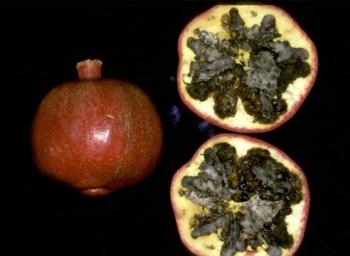Posts Tagged: Themis Michailides
'Great Day' morning program features UC Kearney Ag REC
The popular morning television program "Great Day," which airs daily on KMPH Channel 26 in Fresno, featured the work of scientists at the UC Kearney Agricultural Research and Extension Center in six live segments during the five-hour program this morning.
Reporter Clayton Clark and photographer Ryan Hudgins arrived at the Kearney greenhouse at 4:30 a.m. to interview the scientists helping California farmers feed the nation and world sustainably.
See clips of the interviews in the one-minute video below:
Segments included:
- An overview of research and extension activities at Kearney by director Jeff Dahlberg.
- UC blueberry and blackberry research that has made these commodities important crops in the San Joaquin Valley with Manuel Jimenez, UC Cooperative Extension farm advisor in Tulare County.
- Beneficial insects, pests and invasive species that are part of research by Kent Daane, UCCE specialist in the Department of Environmental Science and Policy Management at UC Berkeley. Daane shared a handful of leaf-footed bugs with the reporter.
- How global information systems are changing the way farmers and researchers are looking at farmings systems with Kris Lynn-Patterson, coordinator of the GIS program at Kearney.
- Just like people, plants get sick. UC plant pathologist Themis Michailides explained research efforts to cure plant diseases.
- Uncommon wine varieties that might lead to new fine wines ideally suited to be produced in the Valley's warm climate, with Matt Fidelibus, UCCE specialist in the Department of Viticulture and Enology at UC Davis.
- The very real threat of West Nile virus in mosquitoes in the valley, with medical entomologist Anton Cornel.
Pistachio crop threatened by fungus
The California Report, a popular radio news program that is broadcast throughout the state on public radio stations, devoted five minutes this morning to a solution found at the UC Kearney Agricultural Research and Extension Center for a serious pistachio production problem.
Reporter Alice Daniel interviewed Kearney-based UC Davis plant pathologist Themis Michailides, who led the team that discovered how to expose pistachio trees to spores of a beneficial fungus that displaces the fungi that produce aflatoxin.
Though the story was broadcast this morning, it can still be heard on The California Report website and is embedded below:
For more information on the beneficial fungus, AF-36, which was used for the first time in commercial pistachio orchards this past summer, read Pistachio farmers enlist a beneficial fungus to battle aflatoxin.
UC scientists studying 'baffling' pomegranate ailment
A mysterious sudden crippling or death of pomegranate trees may be due to cold temperatures, said a story in Western Farm Press.
Three farmers and Themis Michiliades, UC Davis plant pathologist based at the UC Kearney Agricultural Research and Extension Center, agreed that low temperatures have a lot to do with the problem. Michailides cited an Iranian research paper that showed similar cold snap damage. Michailides and Richard Molinar, UC Cooperative Extension farm advisor in Fresno County, said damage from dieback this year was more common in sandier soils, perhaps because heavier soils hold moisture.
Writer Dennis Pollock reported on the problem in his article about a recent pomegranate field day at Kearney. At the field day, Michailides also reported on "black heart" of pomegranate, caused by Altenaria fungus, and cankers caused by species that include Neofusicoccum mediterraneum.
Claude Phené, a retired USDA-ARS researcher, discussed a two-year-old pomegranate irrigation and fertigation trial at Kearney.



